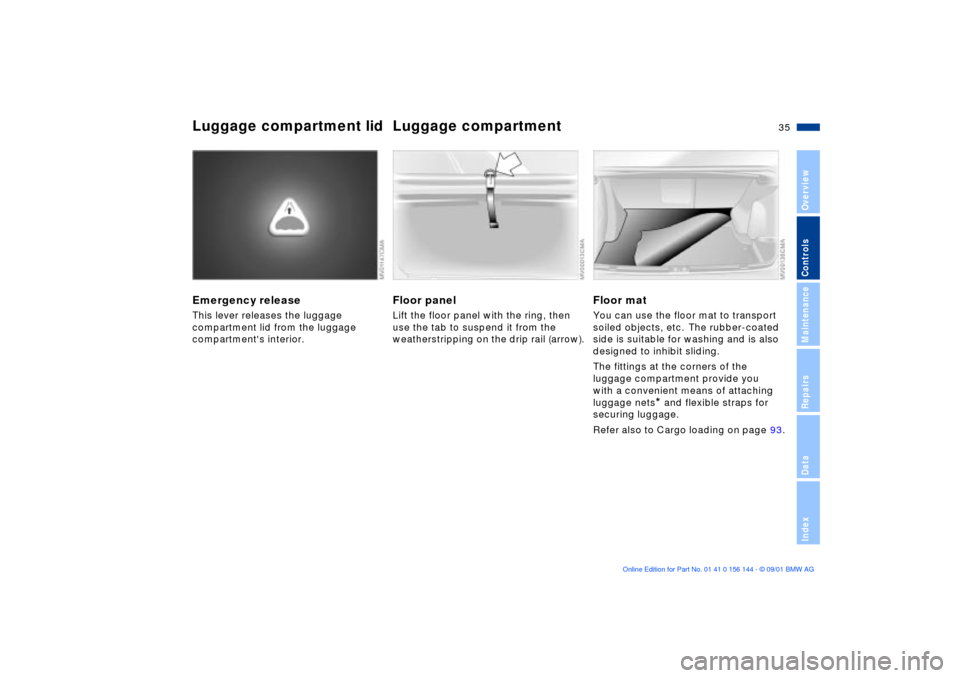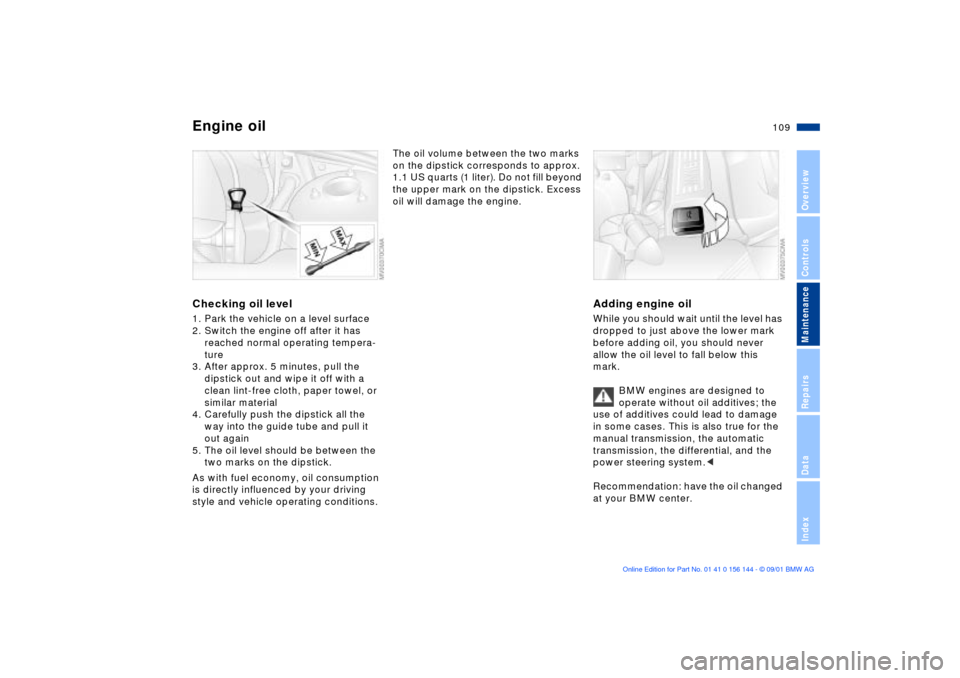2002 BMW 325Ci COUPE oil
[x] Cancel search: oilPage 5 of 147

5n
OverviewControlsMaintenaceRepairsDataIndex
Controls and features
Operation, maintenance
Lamps:
Parking lamps/Low beams77
Instrument lighting78
High beams/Standing lamps78
Fog lamps78
Interior lamps79
Controlling the climate for
pleasant driving:
Air conditioning80
Automatic climate control83
Roller sun blind86
Interior conveniences:
Premium sound system86
Glove compartment87
Storage compartments87
Cellular phone89
Ashtray, front89
Ashtray, rear90
Clothes hooks90
Loading and transporting:
Through-loading system91
Ski bag92
Cargo loading93
Roof-mounted luggage rack94
Special operating instructions:
Break-in procedures98
Driving notes99
Antilock Brake System (ABS)99
Brake system100
Wheels and tires:
Tire inflation pressure101
Tire condition101
Tire replacement102
Wheel and tire
combinations104
Winter tires105
In the engine compartment:
Hood106
Engine compartment
essentials107
Washer fluids108
Engine oil109
Coolant111
Brake fluid112
Maintenance:
The BMW Maintenance
System113
Laws and regulations:
Technical modifications114
California Proposition
65 Warning114
OBD interface socket115
Page 17 of 147

17n
OverviewControlsMaintenanceRepairsDataIndex
Indicator and warning lamps
Technology that monitors itself
Indicator and warning lamps that are
identified by
l
are tested for proper
functioning whenever the ignition key is
turned. They each light up once for
different periods of time.
If a fault should occur in one of these
systems, the corresponding lamp does
not go out after the engine is started, or
it lights up while the vehicle is moving.
You will see how to react to this below.
Red: stop immediately
Battery charge current
l
The battery is no longer being
charged. Indicates a defective
alternator drive belt or a problem with
the alternator's charge circuit. Please
contact the nearest BMW center.
If the drive belt is defective, stop
and switch off the engine immedi-
ately to prevent overheating and
serious engine damage. If the drive belt
is defective, increased steering effort is
also required.
<
Engine oil pressure
l
Stop the vehicle immediately
and switch off engine. Check
the engine oil level and top off as
required. If the oil level is correct,
please contact the nearest BMW
center.
Do not continue driving, as the
engine could sustain serious
damage from inadequate lubrication.
<
Brake warning lamp
l
If the lamp comes on when the
parking brake is not engaged:
check the brake fluid level. Before
driving further, be sure to comply with
the instructions on pages 100 and 112
Brake warning lamp for Cana-
dian models.
Tire Pressure Monitor (RDC)/
Flat Tire Monitor
l
In addition, an acoustic signal is
sounded: a tire failure has occurred.
Reduce vehicle speed immediately to
stop the vehicle. Avoid hard brake
applications. As you steer the vehicle,
use caution and avoid overcorrecting.
For additional information: refer to
pages 73, 75
Page 19 of 147

19n
OverviewControlsMaintenanceRepairsDataIndex
Indicator and warning lamps
Yellow: check as soon as possible
Antilock Brake System (ABS)
l
ABS has been deactivated in
response to system malfunction.
Conventional braking performance
remains available without limitations.
Please have the system inspected by
your BMW center. For additional infor-
mation: refer to page 99
ABS warning lamp for Canadian
models.
Engine oil level
Comes on while driving: the
engine oil level has fallen to the
absolute minimum; refill as soon as
possible. Do not drive more than
approx. 30 miles (50 km) until you do.
For additional information: refer to
page 109
Engine oil level
Comes on after the engine has
been shut off: add more engine
oil at the earliest opportunity (next time
you stop to refuel).
For additional information: refer to
page 109
Brake pads
l
Have the brake pads checked.
For additional information: refer
to page 100
Tire Pressure Monitor (RDC)/Flat
Tire Monitor
l
Check tire inflation pressures.
Refer to pages 24, 73, 76
Automatic Stability Control plus
Traction (ASC+T)/Dynamic
Stability Control (DSC)
l
Indicator lamp flashes:
The system is actively regulating drive
torque and braking force.
The indicator lamp stays lit:
ASC+T has been switched off with the
button or it is defective, or the DSC has
been switched off, ADB is operational.
Please consult the nearest BMW center
in case of a malfunction.
Additional information beginning on
page 70
Indicator lamp for Automatic
Stability Control plus Traction
(ASC+T)/Dynamic Stability
Control (DSC) and brake
warning lamp
l
The indicator lamps remain on:
The DSC
and ADB/DBC have been
switched off manually or there is a
system malfunction.
Please consult the nearest BMW
center.
For additional information: refer to
page 71
DSC and ADB indicator and
brake warning lamps for Cana-
dian models.
Dynamic Brake Control (DBC)
l
Malfunction in the DBC system.
Conventional braking efficiency
is available without limitations.
Have the system repaired by your BMW
center.
For additional information: refer to
page 72
Page 35 of 147

35n
OverviewControlsMaintenanceRepairsDataIndex
Luggage compartment lid Luggage compartment Emergency releaseThis lever releases the luggage
compartment lid from the luggage
compartment's interior.
Floor panelLift the floor panel with the ring, then
use the tab to suspend it from the
weatherstripping on the drip rail (arrow).
Floor matYou can use the floor mat to transport
soiled objects, etc. The rubber-coated
side is suitable for washing and is also
designed to inhibit sliding.
The fittings at the corners of the
luggage compartment provide you
with a convenient means of attaching
luggage nets
* and flexible straps for
securing luggage.
Refer also to Cargo loading on page 93.
Page 65 of 147

65n
OverviewControlsMaintenanceRepairsDataIndex
Fuel gauge Temperature gauge Service Interval DisplayOnce the indicator lamp stays on
continuously, there are still approx.
2 gallons (8 liters) of fuel in the fuel
tank.
For fuel tank capacity, refer to
page 135.
Certain operating conditions (such as
those encountered in mountainous
areas) may cause the needle to fluc-
tuate slightly.
Please refuel early, since driving
to the last drop of fuel can result in
damage to the engine and/or catalytic
converter.<
When you switch on the ignition, the
indicator lamp lights up briefly as an
operation check.
BlueThe engine is still cold. Drive at
moderate engine and vehicle speeds.RedWhen you switch on the ignition, the
warning lamp comes on briefly to
confirm that the system is operational.
If the lamp comes on during normal
vehicle operation: the engine has over-
heated. Stop and switch the engine off
immediately and allow it to cool down.
Checking coolant level, refer to
page 111.Between the blue and red zonesNormal operating range. The needle
may rise as far as the edge of the red
sector in normal operation.
Remaining distance to serviceThe displays shown in the illustration
appear for a few seconds when the
ignition key is in position 1 or after the
engine is started.
The next service due appears with the
message OIL SERVICE or INSPECTION,
together with the distance remaining in
miles (kilometers) before the next sched-
uled service.
The computer bases its calculations of
the remaining distance on the preceding
driving style.
A flashing message and a "Ð" in front of
the number mean that the service inter-
val has already been exceeded by the
distance shown on the display. Please
contact your BMW center for an
appointment.
Page 105 of 147

105n
OverviewControlsMaintenanceRepairsDataIndex
Winter tiresChoosing the right tireBMW recommends winter tires (M+S
radial tires) for operation under
inclement winter driving conditions.
While all-season tires (M+S designa-
tion) provide better winter traction than
summer tires with the load ratings H, V,
W, Y and ZR, they generally do not
achieve the performance of winter tires.
In the interest of safe tracking and
steering response, install winter tires
made by the same manufacturer having
the same tread configuration on all four
wheels.Never exceed the maximum
speed for which the winter tires
are rated.
Unprofessional attempts by laymen to
service tires can lead to damage and
accidents.
Have this work performed by trained
professionals only. Any BMW center
has the required technical knowledge
and the proper equipment and will be
happy to assist you.<
Tire condition, tire pressureOnce the tire wears to below 0.16 in
(4 mm), winter tires display a percep-
tible decrease in their ability to cope
with winter driving conditions, and
should be replaced in the interest of
safety.
Comply with the specified tire inflation
pressures Ð and be sure to have the
wheel and tire assemblies balanced
every time you change the tires.
StorageAlways store tires in a cool, dry place.
Store them away from light whenever
possible. Protect the tires against
contact with oil, grease and fuel.Snow chains
*
BMW narrow-link snow chains are
intended for mounting on summer or
winter tires in pairs at the rear wheels
only. Comply with all manufacturer's
safety precautions when mounting the
chains.
You cannot mount snow chains on the
following tires:
225/50 R 16 92
225/45 R 17 91
245/40 ZR 17
Page 107 of 147

107n
OverviewControlsMaintenanceRepairsDataIndex
Engine compartment essentials1 Brake fluid reservoir112
2 Engine oil dipstick1093 Coolant expansion tank111
4 Reservoir for the headlamp and
windshield washer system1085 Engine oil filler neck109
6 Auxiliary terminal for
jump-starting128
Page 109 of 147

109n
OverviewControlsMaintenanceRepairsDataIndex
Engine oilChecking oil level1. Park the vehicle on a level surface
2. Switch the engine off after it has
reached normal operating tempera-
ture
3. After approx. 5 minutes, pull the
dipstick out and wipe it off with a
clean lint-free cloth, paper towel, or
similar material
4. Carefully push the dipstick all the
way into the guide tube and pull it
out again
5. The oil level should be between the
two marks on the dipstick.
As with fuel economy, oil consumption
is directly influenced by your driving
style and vehicle operating conditions.
The oil volume between the two marks
on the dipstick corresponds to approx.
1.1 US quarts (1 liter). Do not fill beyond
the upper mark on the dipstick. Excess
oil will damage the engine.
Adding engine oilWhile you should wait until the level has
dropped to just above the lower mark
before adding oil, you should never
allow the oil level to fall below this
mark.
BMW engines are designed to
operate without oil additives; the
use of additives could lead to damage
in some cases. This is also true for the
manual transmission, the automatic
transmission, the differential, and the
power steering system.<
Recommendation: have the oil changed
at your BMW center.